DOE Human Subjects Resources
DOE Protecting Human Research Subjects Newsletter
The newsletter addresses current issues and concerns about human research supported by DOE. It focuses on DOE laboratories and specific issues DOE laboratories face while conducting human subject research at their facilities. The newsletter often refers the reader to materials or informational contacts that may provide further guidance on human subjects research. The newsletter also announces upcoming meetings and other events that cover human research topics.
The following documents are available as PDF files. To view them, you will need the Adobe Acrobat Reader, which can be downloaded free from the Adobe Support Site.
Issue 22, Summer 2011
- Is anonymization of data really possible?
- Arguments for and against abolishing consent forms.
- Community member workshop ideas; i.e., how to engage community members in the IRB’s work and how to enhance their contribution.
- What attributes to look for when selecting a community member.
- Ezekiel Emanuel outlines both criticisms and inconsistencies of regulations and asks where we go from here.
- U.S. Department of Health and Human Services is considering ways of enhancing regulations overseeing research on human subjects.
- Eva Mozes Kor recounts her participation in Auschwitz death camp experiments.
- Ethical issues in new technologies; i.e., problems with sharing genomic information, confidentiality, conflicts of interest, genetic nondiscrimination, etc.
- Concern about the quality of information about alternatives to research that is found in consent forms.
- Research with cognitively impaired subjects—why IRB review matters.
- Research during humanitarian emergencies—data should produce some benefit to population from which the data is coming.
- Conducting ethical research during disasters, war, and other complex emergencies.
- International Research Panel of the Presidential Commission for the Study of Bioethical Issues releases its report.
Issue 21, Winter 2011
- The U.S. Food and Drug Administration describes its wide-ranging effort to improve quality and trust in human subjects research.
- Should research results be shared with donors of biological samples? Bioethicist says Yes. Accuracy of information says No. More participants if Yes.
- The contributions of community IRB members were the focus of discussions in San Diego.
- DOE’s Elizabeth White says regular self-assessments and external reviews are critical to the continuous improvement of human research protection programs.
- Brookhaven National Lab receives full accreditation from the Association for the Accreditation of Human Research Protection Programs.
- Lawrence Livermore National Laboratory chooses OHRP’s QA consultation rather than accreditation.
- Human subject volunteers don’t care whether the consent form is long or short; clarity is what counts.
- Emory University had 22 conflict of interest policies, but the gaps caused headaches.
- Effects of conflicts of interest on research. On participants.
- Federal funding for human subjects research is at an historic high.
Issue 20, Fall 2010
- Ellen Clayton, Director of Vanderbilt's Center for Biomedical Ethics and Society discusses data sharing and human subjects
- The Central DOE IRB is up and running. Elizabeth White, DOE's Program Manager for Protection of Human Research Subjects, Describes its task
- The Belmont Report may not adequately address some current research issues
- How can community members be most useful to communities and to research?
- The Former Worker Medical Screening Program has provided about 70,000 evaluations
- People can't be counted on to make rational choices, which should be understood by those designing research protocols.
- The case for centralized IRB review is made by Dan Nelson of the University of North Carolina, Chapel Hill.
- The case for local IRB review is made by David Forster of Western IRB
Issue 19, Winter 2009
This issue of Protecting Human Subjects considers ways to improve the day-to-day operations of IRBs and other oversight agencies. This includes contingency planning for times when IRBs have to replace administrators and members, either temporarily or permanently. Also included in this issue is a report about the implications of a recent Government Accounting Office study, which concluded that the IRB system is vulnerable to unethical manipulation.
- Katherine Ertell discusses ways to protect your organization when key personnel need to be replaced
- Nancy Walton, author of The Research Ethics Blog, considers the challenges IRBs face when researchers study social networks such as Facebook
- Brookhaven National Laboratory has established a system for post-approval monitoring of studies
- The Genetic Information Nondiscrimination Act (GINA) has research exceptions
- The Government Accounting Office found vulnerabilities in the IRB system, including bogus registrations
Issue 18, Spring 2009
This edition of Protecting Human Subjects focuses on issues related to the evolving understanding of regulations designed both to protect human subjects and encourage research. Articles consider the issue of whether IRBs need more or less rigid oversight and whether flexibility is a virtue or a vice. Other articles raise questions about whether some assumptions about human subjects protection should be reconsidered and whether there are better ways to protect the vulnerable.
- Ivor Pritchard, director, Office of Human Research Protections, on flexibility in applying regulations
- Rethinking exploitation of vulnerable populations
- NIH says informed consent must be a “robust” process in stem cell research
- What IRBs need to know about data bank specimens and the uncertainty of confidentiality
- Research is shifting from academic institutions to commercial industries
- DOE’s Central Beryllium IRB adds the Former Worker Medical Screening Program
- Pittsburgh is trying to change African American mistrust of the research community
- What do social scientists want in their relationships with IRBs?
- Ethical standards should not change for research in the developing world
- The danger of exploitation in globalizing clinical trials
- When researchers attend IRB meetings, things work more smoothly
- Ways to avoid conflict between IRBs and investigators
Issue 17, Fall 2008
This edition of Protecting Human Subjects focuses on issues of self-assessment, external review, and accreditation as ways to improve IRB effectiveness.
- Sandia National Lab chose OHRP's Quality Improvement Program (QIP) rather than accreditation
- Pacific Northwest National Lab found accreditation worked best
- DOE's policy regarding accreditation and assessment is a graded approach
- OHRP posts new guidance on human research
- Oak Ridge says OHRP's QIP is a perfect fit
- AAHRPP accreditation
- Brookhaven Lab beginning accreditation process
- University of Miami on the hard work accreditation requires
- Michael Ardaiz named DOE's new Chief Medical Officer
- Former Worker Program screened more than 52,000
Issue 16, August 2008
- Bioethicist Art Caplan says IRB focus should be informed consent.
- Is it always coercive to offer incentives to research subjects?
- IRB scrutiny is "often unnecessary" for oral historians.
- Sandia Lab delegation in Russia for collaborative study.
- Does the complexity of consent hinder research?
- An ethical duty to participate in research.
- Social-behavioral research is not without risks.
- Genetic studies must consider risk to family, ethnic, and tribal groups.
- Questions about changes to the Declaration of Helsinki.
- Ambiguity is inherent to subject vulnerability
Issue 15, November 2007
- Elizabeth White named new Human Subjects Protection Officer
- SACHRP recommendations: risk, consent & IRB models
- DOE's redesigned human subjects Web site
- Unique ethics compliance training tools
- Revised DOE order for protecting human subjects
- Bernard Schwetz on international research protections
- Disaster research & protecting human subjects
- Gigi McMillan on listening to children in research
Issue 14, Fall 2006
- An IRB success story for LLNL
- Protecting subjects "to death"?
- Informed consent
- Conflicts of interest threaten trust
- How researchers view IRBs
Issue 13, Spring 2006
- Human Subjects Risk in new nanotechnologies
- Use of information from the haplotype map ("HapMap")
- International research issues
Issue 12, Summer 2005
- Relationships between IRBs and investigators
- Compliance vs. ethics
- Ethnography and consent
- Consent as an ongoing process
Issue 11, Fall 2004
- Discussion on the various ways that can either assist or impede communication related to Institutional Review Boards (IRBs) and Human Subjects Protection Programs (HSPPs)
- Ideas designed to improve the way information, ideas, expectations, and assurances are relayed
Issue 10, Summer 2004
- Focus on the Belmont Report: highlights of discussions held at the December 2003 Public Responsibility in Medicine and Research (PRIM&R) meeting
Archive
Fall 2003 | Spring 2003 | Summer/Fall 2002 | Winter 2001/2002 | Summer 2001 | Fall 2000
Summer 2000 | Winter 1999/2000 | Spring 1999 | Fall 1998 | Fall 1997 | Spring 1997
Winter 1996 | Fall 1996 | Fall 1994 | Spring 1994 | Spring 1993 | Fall 1992
Content reviewed: August 27, 2012



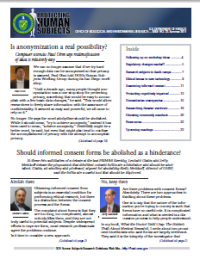 In this issue:
In this issue: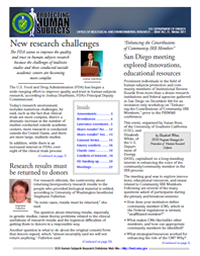 In this issue:
In this issue: In this issue:
In this issue: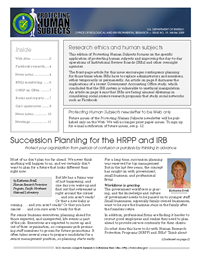 In this issue:
In this issue: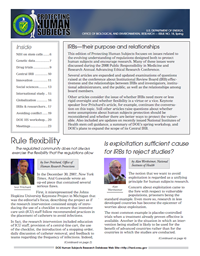 In this issue:
In this issue: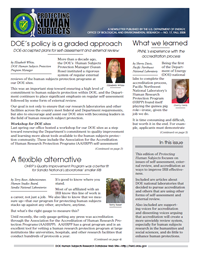 In this issue:
In this issue: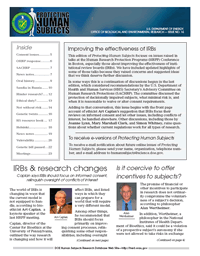 In this issue:
In this issue: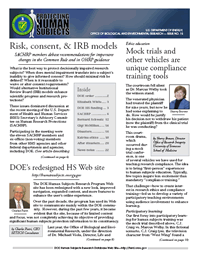 In this issue:
In this issue: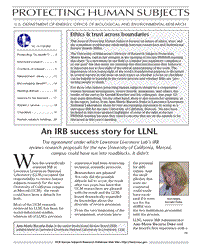 In this issue:
In this issue:
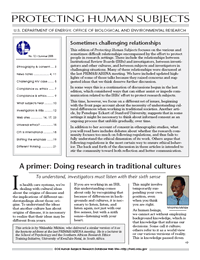
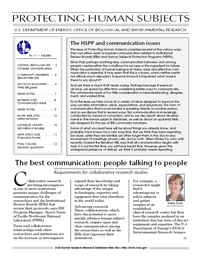 In this issue:
In this issue: In this issue:
In this issue: